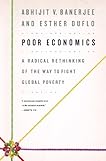 Poor Economics: A Radical Rethinking of the Way to Fight Global Poverty by Abhijit Banerjee
Poor Economics: A Radical Rethinking of the Way to Fight Global Poverty by Abhijit BanerjeeMy rating: 5 of 5 stars
Poor Economics is about the world's poor (living on the equivalent of 99 cents a day, not including housing) and how best to help them. There are basically two broad schools of thought on how to help: for example, in education one group (the "supply wallahs") says we just need to get kids into schools with good teachers, and the rest will take care of itself. (i.e. ensuring the supply of education will solve the problem) The other group (the "demand wallahs") says there's no point in doing this if the parents don't believe there's value in education, and it's a waste of money (and possibly screws up the free market) to spend aid dollars on it.
It should come as no surprise that people generally are in one group or the other based on ideology. This book was written by the cofounders of the Poverty Action Lab, which conducts randomized control trials to actually figure out what ways of helping the poor are the most effective.
One of the big questions is whether a "poverty trap" exists with respect to a particular issue. A "poverty trap" means that if you're stuck at a very low income level, there's no good way to increase your income without getting an infusion of cash. "Supply wallahs" generally believe that poverty traps exist, and giving aid will help people get out of the trap and support themselves, while "demand wallahs" generally believe that poverty traps don't exist and aid will be wasted.
Now, to randomly call out parts I found interesting: (yay for Kindle highlighting!)
- A nutrition poverty trap would be if people were hungry enough to make them weak and unable to work, and thus spiral down into making less and less income. This does not seem to be the case for most adults, as when the poor get more money to spend on food they tend to spend it on better-tasting calories instead of more calories, thus indicating that they weren't seriously short on calories in the first place. However, getting proper nutrients to children is a problem, and giving away food with lots of nutrients does make children develop better. Each year of improved nutrition for a child increases their average income as an adult.
- Malaria is a serious problem in a lot of poor countries, and one simple preventative measure is to sleep under a bed net to keep out mosquitos. Poor people seem to realize this is a generally good idea, but bed nets are rather expensive (equivalent of $10) and the effects are hard to see immediately. (it's hard to quantify _not_ getting sick in the short term) Poor people, like all of us, are prone to procrastination in these sorts of circumstances, and so giving away bed nets does help to break the cycle. In fact, after being given a free bed net, they're more likely to buy one at full price when given the opportunity later. More developed societies have lots of ways to force us to do things that are good for us but that we might put off otherwise - for example, schooling is mandatory for children, and vaccination is mandatory to enroll in school; our drinking water is chlorinated for us; and our sewage is piped away. This lessens our cognitive load so we don't constantly have to make important decisions and fight the urge to procrastinate. Research has shown that we have a limited supply of willpower that gets drained when we have to have decisions, and it's no surprise it's harder to make good ones when you have to make them all the time.
- In Brazil, the state doesn't promote family planning, but when telenovelas (soap operas) with female characters with small families (none or one child) first became available in an area, the number of births would drop dramatically.
- Microfinance does help people make money, but the effects weren't as radical as many had hoped.
- A study in Uganda showed that only 13 percent of money allocated by the government for schools actually was received by the schools. (presumably the rest was lost to corruption, etc.) This, of course, is depressing and is why some think most foreign aid is useless without good governmental institutions. However, these results were reported in Uganda and there was an uproar, and when the study was repeated 5 years later, the number was up to 80 percent, showing that just having people care about corruption can be powerful in itself.
There's more good stuff in the book, but I'm all summarized out. You can read more about it at the book's website pooreconomics.com.
View all my reviews